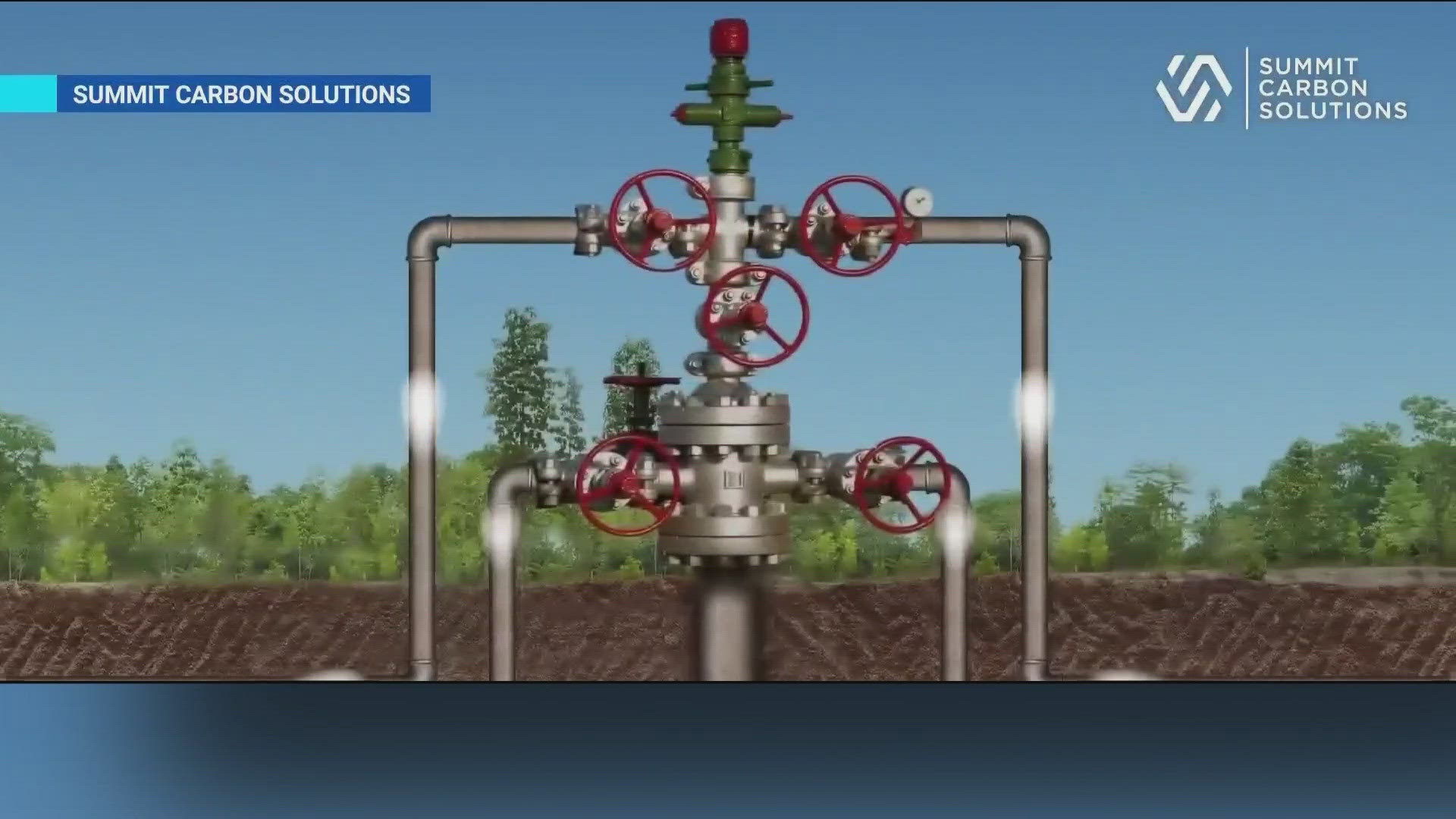MINNESOTA, USA — A board of Minnesota regulators granted approval to a controversial carbon capture pipeline that has long drawn the ire of rural environmentalist groups.
The Minnesota Public Utilities Commission (PUC) approved the proposal from Ames, IA-based Summit Carbon Solutions for a carbon capture and storage pipeline project on Thursday.
“The Commission appreciates the robust stakeholder and landowner participation in this project,” said PUC Commissioner John Tuma, in a statement.
Despite the commission's approval, Carbon Solutions can't start construction in Minnesota until work has begun in North Dakota, said Tuma.
The PUC approved a "Otter Tail to Wilkin Carbon Dioxide Pipeline Project, which would be a 28-mile, 4.5 inch diameter carbon steel pipeline.
It's part of a massive pipeline project that would link five states and cost more than $4 billion.
In total, the project calls for 1,958 miles of pipeline, in Iowa, Minnesota, Nebraska, North Dakota and South Dakota, that will capture carbon dioxide from biorefineries, before compressing the CO2 into the pipeline for its destination in North Dakota.
Landowners in several states have complained about the proposed pipeline, with one such case going to the state's supreme court in Iowa. In that case, the Iowa Supreme Court ruled against a landowner who wanted to block representatives from Summit Carbon from entering his property.
The approval doesn’t come as a surprise to Sarah Mooradian, government relations and policy director at CURE, a rurally based non-profit focusing on environment issues and rural spaces and how those things intersect.
“We’re disappointed,” she said. “We really need to kind of pump the brakes on this. This would be Minnesota’s first CO2 pipeline. We don’t have experience with this. The company itself has never built a CO2 pipeline.”
Mooradian is concerned people living in rural communities weren’t heard on this project.
“Will they kind of be bearing the burden of this project or will they get any benefits from this project? We’re also concerned about safety,” she said. “We need to be taking a closer look, slower look at this. Is it doing the things the company says it will be doing, do we have the proper safety guardrails in place. Who’s going to benefit from this.”
She’s also worried about environmental and human health impacts.
“We know that back in 2020 that a larger CO2 pipeline ruptured back in Sartoria, Mississippi, sent about 45 people to the hospital for treatment as well as 200 people had to be evacuated from Sartoria,” she said.
Mooradian said she is worried this pipeline could become an enhanced oil recovery pipeline. According to the Department of Energy, this technique would inject carbon dioxide into the reservoir rock of an existing oil field to recover more oil and natural gas than would otherwise have been produced.
“Carbon capture and carbon pipelines have been around, that technology has been around since about 1970, but they’ve been used almost exclusively for enhanced oil recovery not in what we’re starting to see come about today which is dedicated geological storage,” she said.
Kevin Pranis, marketing director for Liuna! Minnesota and North Dakota said carbon capture pipelines are a key tool when it comes to climate change. He’s also on the Minnesota Governor’s Advisory Council on Climate Change.
“The science says globally carbon capture is essential to every viable pathway to getting to stabilizing our climate,” he said. “These are all facilities that emit carbon every single day. This pipeline means that most of those emissions are eliminated.”
He said this pipeline will bring thousands of jobs to the region and would be one of the largest climate infrastructure projects in the upper Midwest.
“Our members are really committed to being a part of the solution to climate change and what our members wanted a chance to put those skills to work,” he said. “These aren’t just jobs. These are career opportunities to bring people into construction trades to [earn] a middle class living and to have healthcare for your entire family and pension.”
Pranis said Liuna! is committed to climate progress as any organization out there and said this pipeline has been studied closely. He said they’re optimistic Summit will get the necessary permits to move the project forward. He said once it’s built other industries could tap in like cement because they are a major producer of carbon dioxide.
Amelia Vohs, climate director at Minnesota Center for Environmental Advocacy said she was pleased to see PUC put protections in place for Minnesota.
“If there’s funding issues, if they’re not able to complete it, if they can’t get permits needed in other jurisdictions that Minnesota isn’t left with a half-build, half-baked project,” Vohs said.
However, she wasn’t happy it got approved.
“We weren’t excited about the project. We don’t actually think it’s a great climate solution and it could actually result in increased greenhouse gas emissions,” Vohs said. “It’s a tricky balance. It’s always good to capture emissions but you could inadvertently be creating more emissions earlier in the life cycle chain of the ethanol.”
She said there are financial incentives for companies to build these types of pipelines.
“There have been a couple incentives. There’s some federal legislation that grants tax credits for capturing these carbon dioxide from these ethanol facilities, so that’s a financial incentive. There are also low carbon fuel markets like California,” she said. “I would say, the impetus for the project is that there is money to be made by capturing the carbon dioxide.”
Vohs said what the exact climate consequences will be are still unclear.

